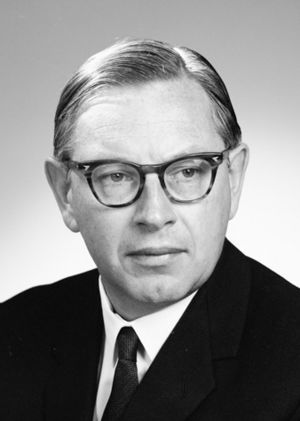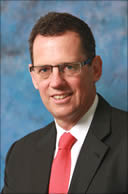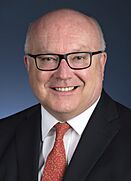Solicitor-General of Australia facts for kids
Quick facts for kids Solicitor-General of Australia |
|
|---|---|
|
Incumbent
Stephen Donaghue since 16 January 2017 |
|
| Attorney-General's Department | |
| Appointer | Governor-General on the recommendation of the Prime Minister |
| Inaugural holder | Sir Robert Garran |
| Formation | 1916 |
The Solicitor-General of Australia is a very important legal job in Australia. It's the second highest-ranking law officer in the country, right after the Attorney-General for Australia. The person holding this job right now is Stephen Donaghue. He started on January 16, 2017.
The Solicitor-General gives legal advice to the Australian federal government. They also go to court to represent Australia in big legal cases, especially in the High Court. For example, during the Australian Parliamentary eligibility crisis, the Solicitor-General gave advice and defended politicians in court. Unlike the Attorney-General, the Solicitor-General is not a member of parliament.
Contents
What is the Solicitor-General?
The Solicitor-General is a top legal expert who helps the Australian government. They are like the government's main lawyer. This role is very important for making sure the government follows the law.
How the Role Began
The job of Solicitor-General was created in 1916. Sir Robert Garran was the first person to hold this position. Before 1916, there was a different role called the Commonwealth Crown Solicitor. Sometimes people called that person the "Solicitor-General," but they were actually different jobs.
The role was created because Attorney-General Billy Hughes became Prime Minister of Australia but wanted to keep his law job too. Robert Garran was already a senior legal officer. The new Solicitor-General role gave him more responsibilities that Hughes passed on. The name "Solicitor-General" comes from a similar job in England that started a long time ago.
Robert Garran stayed as Solicitor-General until he retired in 1932. For many years, the Solicitor-General also had other jobs, like being the main legal advisor for the Attorney-General's Department. In 1964, these jobs were separated. This made the Solicitor-General's role more focused on being an independent legal advisor.
Two former Solicitors-General have become judges in Australia's highest court, the High Court of Australia. These were Anthony Mason and Stephen Gageler. It is rare for a Solicitor-General to become the Attorney-General, which is a political job. Only one person, Bob Ellicott, has done both.
What Does the Solicitor-General Do?
To become the Solicitor-General, a person must be a lawyer with at least five years of experience. Their main job is to give legal advice and represent the Commonwealth in court. It's very important that they act independently and are not influenced by politics. They must always follow the rule of law.
The Solicitor-General often deals with laws about Australia's Constitution and public law. They usually represent the government in constitutional disagreements. Sometimes, they also represent Australia in international legal cases. Before 1979, they also handled criminal cases, but now a different office, the Director of Public Prosecutions, does that.
How Long Do They Stay in the Job?
The Solicitor-General is appointed for a set period, usually up to seven years. Recently, they have often been appointed for five-year terms. The law says they can only be removed from their job for serious reasons like illness, bad behavior, or bankruptcy. This rule helps them stay independent and not worry about being fired for their legal advice.
Main Responsibilities
The law clearly states what the Solicitor-General's jobs are. They act as a lawyer for the Commonwealth, government ministers, and other government groups. They also give legal opinions on questions that the Attorney-General asks them.
There has been some discussion about whether the Attorney-General can control who gets advice from the Solicitor-General. In 2016, former Solicitor-General Justin Gleeson said that the Attorney-General should not be able to stop others from getting advice. However, he did introduce a system where the Attorney-General would be told about requests for advice and get copies of the advice given. This did not apply to the Prime Minister or Governor-General seeking secret advice.
Other former Solicitors-General, like Anthony Mason and Gavan Griffith, agreed that the Solicitor-General should be able to give advice without needing the Attorney-General's permission first. However, Attorney-General George Brandis believed that only he could ask the Solicitor-General for legal advice. Because of these different views, some legal experts think the law needs to be made clearer.
Working with the Attorney-General
The Solicitor-General and the Attorney-General are known as Australia's Law Officers. People expect the government to get and follow their legal advice when making big decisions. Since the Solicitor-General is an independent legal expert, they help the Attorney-General guide parliament and the public on legal and constitutional issues.
Sometimes, the Attorney-General, who is a politician, might not have a lot of legal experience. This is where the Solicitor-General's role as a non-political legal advisor becomes very important. They help make sure the government gets expert legal services.
When the Solicitor-General role was first created, some people worried about who would be responsible for their actions. To fix this, it was decided that the Attorney-General would be responsible for the Solicitor-General's work. Solicitor-General Gleeson said that they should work together closely. He used to send monthly reports to the Attorney-General about advice requests and advice given.
Solicitor-General Gleeson's Resignation
On November 7, 2016, Solicitor-General Justin Gleeson resigned. He said his relationship with Attorney-General George Brandis was "broken." Gleeson felt he wasn't asked for advice on important laws, like those about marriage equality or citizenship for people with dual nationality.
He also felt that his legal opinions were sometimes misunderstood by the public. For example, he said he wasn't asked for advice on a law to take away citizenship from dual nationals involved in terrorism. But the government suggested he had said the law would be successful in court.
The main problem was that Gleeson said he wasn't consulted about a new rule. This rule meant that the Attorney-General had to approve any legal questions sent to the Solicitor-General for advice. Gleeson believed this rule stopped the Solicitor-General from giving independent advice. He worried this would be a problem if, for example, the Governor-General needed urgent advice during a political crisis. Brandis said he had consulted Gleeson. This disagreement led to a government inquiry, which mostly agreed with Gleeson.
In his resignation letter, Gleeson said that the country is best served when the Law Officers trust each other and have a respectful relationship. He felt this trust was broken with Brandis.
Important Cases and Advice
The Gair Affair (1974)
In 1974, Prime Minister Gough Whitlam offered a senator named Vince Gair a job as an ambassador. Whitlam hoped that if Gair resigned, his political party could win Gair's vacant seat and gain more power in the Senate. However, the Premier of Queensland, Joh Bjelke-Petersen, called an election for Senate seats before Gair could officially resign. This meant Gair's seat would not be open for the election.
The Solicitor-General at the time, Maurice Byers, gave his legal opinion. He said that Gair was no longer a senator from the date his new job was approved. This date was before the election was called. However, the other political parties pointed out that the government had not stopped Gair from being involved in Senate debates before the election was called. This situation ended with Whitlam calling a special election for all Senate seats.
Case About East Timor (1991)
In 1991, Portugal took Australia to the International Court of Justice. Portugal claimed that Australia had not respected the right of the people of East Timor to decide their own future. Portugal also said Australia had not respected Portugal as the country in charge of East Timor at that time. Gavan Griffith, who was the Solicitor-General, represented Australia in this case. The court could not make a ruling because it needed to consider Indonesia's actions, but Indonesia was not part of the case.
Australian Parliamentary Eligibility Crisis (2017–18)
In 2017 and 2018, several politicians were found to be ineligible to be in parliament. This was because they held dual citizenship, which is against Section 44(i) of the Australian Constitution. Stephen Donaghue, the current Solicitor-General, played a big role in this crisis. He gave advice to politicians and represented them in court. He argued that five of the politicians should not be affected because they didn't know they had dual citizenship. However, the court disagreed, saying that knowing or willingly getting dual citizenship didn't matter. So, the five politicians lost their seats.
COVID-19 Vaccine Mandates (2021)
In 2021, Stephen Donaghue also advised Prime Minister Scott Morrison about COVID-19 vaccine rules. He said that rules requiring vaccines for workplaces would probably not be seen as unfair. Donaghue explained that laws protect people based on things like gender identity or race, but not usually based on whether they have had a vaccine. Even with this advice, Prime Minister Morrison said in August 2021 that the federal government would likely not make vaccines mandatory.
Past Solicitors-General
| Name | Time in Office | University Attended |
|---|---|---|
| Sir Robert Garran KCMG | 1916–1932 | University of Sydney |
| Sir George Knowles CBE | 1932–1946 | University of Melbourne |
| Sir Kenneth Bailey CBE KC | 1946–1964 | University of Melbourne |
| Anthony Mason CBE QC | 1964–1969 | University of Sydney |
| Bob Ellicott QC | 1969–1973 | University of Sydney |
| Sir Maurice Byers CBE QC | 1973–1983 | University of Sydney |
| Gavan Griffith QC | 1984–1997 | University of Melbourne |
| Henry Burmester QC (acting) | 1997–1998 | Australian National University |
| David Bennett AC QC | 1998–2008 | University of Sydney |
| Stephen Gageler SC | 2008–2012 | Australian National University
Harvard Law School |
| Justin Gleeson SC | 2013–2016 | University of Sydney |
| Stephen Donaghue KC | 2017–present | University of Melbourne
Magdalen College, Oxford |
 | Madam C. J. Walker |
 | Janet Emerson Bashen |
 | Annie Turnbo Malone |
 | Maggie L. Walker |




